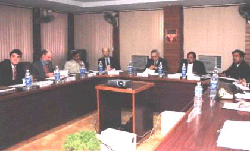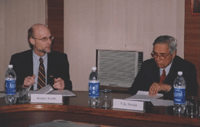Steering Committee
 The XI Central Steering Committee meeting of the IFPS Project held on 6 February, 2004 was unique not just because it was being held in Lucknow for the first time, but, also as it gave a mandate to SIFPSA for undertaking activities under the EAG scheme of Government of India (GoI); acting as the secretariat of the UP Health Foundation; and continuing its activities beyond September, 2004 under the USAID assisted IFPS Project.
The XI Central Steering Committee meeting of the IFPS Project held on 6 February, 2004 was unique not just because it was being held in Lucknow for the first time, but, also as it gave a mandate to SIFPSA for undertaking activities under the EAG scheme of Government of India (GoI); acting as the secretariat of the UP Health Foundation; and continuing its activities beyond September, 2004 under the USAID assisted IFPS Project.
The meeting was chaired by Mr. Prasanna Hota, Secretary, Family Welfare, GoI. Mr. V.K. Dewan, Chief Secretary, Uttar Pradesh, Mr. Walter North, Director, USAID, Mr. Rajendra Bhonwal, Principal Secretary, Family Welfare, Government of UP, Mr. N.S. Kang, Joint Secretary, GoI, Mr. J.S. Deepak, Executive Director, SIFPSA and a team of senior officials from GoI & USAID participated. The meeting also recorded its appreciation for SIFPSA's performance of increasing spacing contraceptive prevelance rate (CPR) to 9 percentage points, achieving the targeted levels for antenatal care and for safe deliveries and helping SIFPSA districts reach CPR of 27.3 percentage points, which is a whopping 6 percentage points more than the rest of UP.
 While in Lucknow to attend the meeting of the Central Steering Committee Mr. Hota visited a PHC and a sub-centre in Lucknow district. Not satisfied with the quality of the services, he desired that SIFPSA should implement its activities in Lucknow district as well and increased the grant under the EAG scheme to facilitate this. Thus, it is apparent that SIFPSA is increasingly seen by the GoI as a solution for meeting the challenge of providing quality RCH services in UP !
While in Lucknow to attend the meeting of the Central Steering Committee Mr. Hota visited a PHC and a sub-centre in Lucknow district. Not satisfied with the quality of the services, he desired that SIFPSA should implement its activities in Lucknow district as well and increased the grant under the EAG scheme to facilitate this. Thus, it is apparent that SIFPSA is increasingly seen by the GoI as a solution for meeting the challenge of providing quality RCH services in UP !
The World Bank assisted RCH-I project from 1999 to 2004 has had mixed results. One of the reasons for this was that it was a centralized project without adequate ownership at the state or field level with inadequate scope for private sector service delivery or institution building. The need for a state design team was one of the lessons learned in RCH-I.
The Government of UP designated Mr. J.S. Deepak, Executive Director, SIFPSA as team leader of state design team for RCH II, assisted by Dr. L.B. Prasad, DG Family Welfare, Dr. Arjun Kumar, Additional Director, Medical, Health & Family Welfare, representatives from UNICEF and CARE, Mr. A.K. Dwivedi, Director, AMS, a consultant firm & Mr. Ganesh Pande from Shramik Bharti, a leading NGO working in the area of reproductive & child health.
The RCH design team was to prepare an integrated programme design for Uttar Pradesh for the next five years 2004-2009. The design process started by identifying priorities of the state. Through extensive meetings & deliberations, held between 22 November, 2003 & 13 February, 2004, the design team evolved a draft Programme Implementation Plan (PIP) for the state. The design process included detailed consultation with the state government & valuable suggestions were obtained from Mr. Rajendra Bhonwal, Principal Secretary, Family Welfare, GoUP, who participated in three meetings of the design team.
Appropriate goals have been set and the team has also identified process & intermediate indicators to facilitate tracking of the activities and for facilitating performance based financing.
The strategic framework of the Programme Implementation Plan (PIP) approved by the Government of Uttar Pradesh was presented before GoI & World Bank officials and was highly appreciated for its comprehensive nature. SIFPSA is likely to be involved in the implementation of RCH-II for planning, implementing strategies, monitoring, tracking & evaluation and providing technical assistance.
- 17 RCH camps in each block PHC/CHC per year.
- Assured availability of trained TBA in each village.
- 50% of block PHCs/CHCs providing basic EmOC & NBC.
- Referral transport support for obstetric emergencies.
- Urban RCH facilities for integrated services in slums.
- Clinical RCH services using NGOs & private sector.
- Decentralized planning and implementation of RCH services at district level.
- Setting up an apex human resource development center.
- Incentives to doctors for residing at identified remote health facilities.
- Behaviour change communication & social marketing.
- MIS, research & evaluation.
- Improving governance & accountability.
Get in Touch with us
(Uttar Pradesh), INDIA
E-Mail : info@sifpsa.org
Phone :(91 - 0522) 2630902,997,741,896,899,894
Fax :
Site Manage by : MARG Software Solutions
2016 © SIFPSA All Rights Reserved
Number of Visitors

